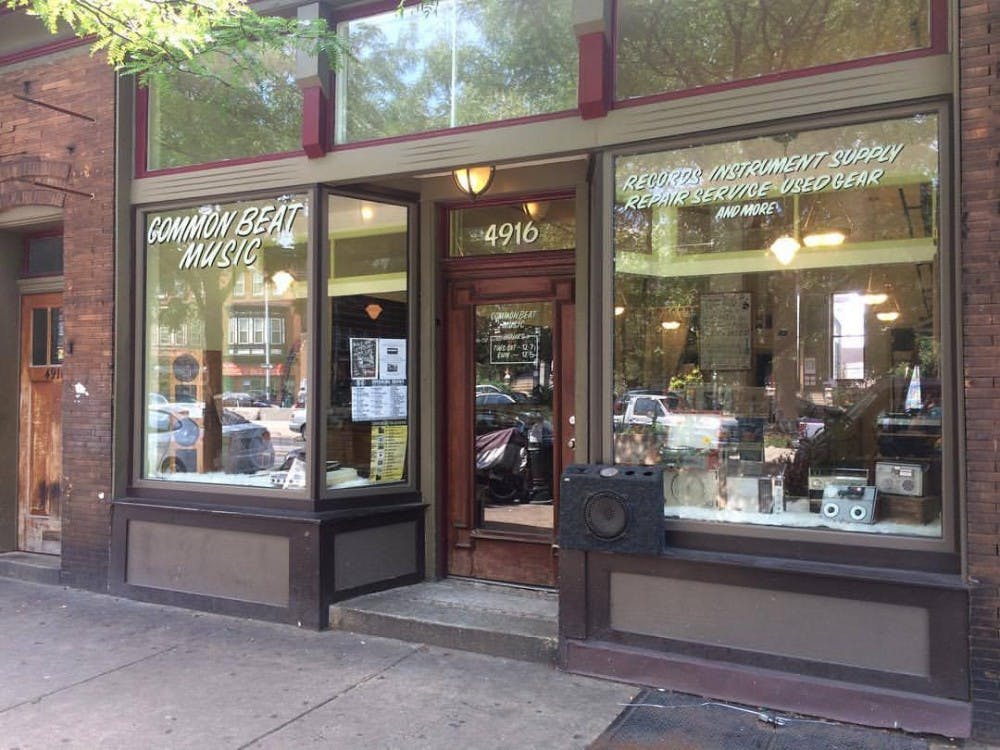A walk down Cedar Park’s Baltimore Avenue reveals a neighborhood in transition. There’s a punk rock hair salon, an ice cream parlor known for its vegan CBD flavor, and no shortage of well–lit brunch spots. There’s also, however, a dollar store, a quiet corner bodega, and a fixture of old men who play dominoes in the park. Right now, Cedar Park is at a pivotal stage in a hard–fought gentrification process: does it want to be “attractive” or inclusive?
For Common Beat Music, a record store and music repair shop that sits in the center of it all, inclusivity is attractive.
Common Beat, owned by inseparable friends Carlo Frese and Keri Girmindl, opened in August 2017 during a watershed moment for both the Cedar Park neighborhood and Frese. A fire overtook Frese’s home and repair shop business, forcing him to freelance out of the neighborhood’s sole record shop, Marvelous Records. Eleven months later, Marvelous closed. Meanwhile, Cedar Park continuously imposed some of the highest rent increases in Philadelphia, driving out residents who settled there in the seventies — back when records and cassette tapes dominated the music landscape. Residents, while outwardly welcoming of change, feared their neighborhood was slipping out their hands.
Common Beat has served to show the community otherwise. According to Girmindl and Frese, the most potent change starts from within.
“People had this idea that we were supposed to be exactly like Marvelous Records, even though we painted the doors and changed the signs, so it took people a long time to realize that we weren’t the same store and things would be run a little differently,” says Girmindl of the initial neighborhood response. “But we were still new, and adaptable, so we constantly tweaked, and still are tweaking, things to fit what people are looking for. That’s how we built a better shop—by asking people what they were looking for during the first few months we were open.”
And what are people looking for? Used records, mostly, and a surprising amount of disco and classical. New releases, notably, pepper the shelves, serving as an exception to a new rule: the record store is a library, not a space for pretension.
“We want to be a place that people who love music in all capacities come to,” says Girmindl, who handles the record store side of the business. By eschewing the self–indulgence often endemic to owning a record store in a favor of an almost entirely customer–driven model, Common Beat poises itself to become a repository of the glory days. A Lou Rawls record will pass through the cash register constantly, while the latest Drake sits dusty. Classical music has its own corner, driven by demand. Every repress in that store is meant to signify West Philly’s diverse and eclectic populace.

And when you bring these tastes together, something beautiful happens.
“[Our collection] opens up this sort of musical language without us really doing anything,” says Frese. He notes that oftentimes, complete strangers will bond over a shared love of a Fleetwood Mac or Bee Gees album, generating a conversation that spans generations.
For the pair, young customers are the best kind of challenge. "It’s kind of like they’re in elementary school and read a book they like, but have no idea where to go next,” says Girmindl. Virtually blank slates, these shoppers leave Common Beat not only more connected with their neighborhood, but connected with genres of music and bands they’d never discover otherwise.
As for the repair side of the business, Frese can’t imagine Common Beat existing without it. A calling and a passion, Frese recognizes that music repair is a lost trade.
“When I moved to Philadelphia, I noticed that all the sort of automatic service places were gone at that point,” notes Frese. A quick Google search indicates that the next closest store to offer services remotely similar to Frese’s—turntable repair, phonograph set–up, and quick amp fixes—is located in Upper Darby, a nearly one–hour train ride away. The repair business has generated a huge demand for the store, and has expanded the clientele past the bounds of 50th Street, Baltimore Avenue, and 42nd. Frese’s knack for the durable fix has carried suburbanites through the store, turning them into regulars, and eventually, the kind of customer who donates.
More than that, however, music repair isn’t a business means for Frese, it’s an end goal.
“This is what I know how to do. I don’t know what else I would be doing if I wasn’t doing this. I didn’t have some cushy job and then quit to pursue some lifelong dream of owning a record store. This is it,” remarks Frese, and for most of the neighborhood, Common Beat is it, too.
It’s hard to imagine another record store that can so seamlessly transplant itself into Cedar Park. Part of this stems from Common Beat’s DIY aura. The entire store operates from the bottom up, with friends of the owners and community members refurbishing the space, powering it, and even filing the business’s taxes. Perhaps this is why Common Beat represents the idyllic frontier of development, that sweet spot where a neighborhood gets the coffee shops and the record stores without losing the bodega. Common Beat was founded on the basis of inclusivity, and that's what makes it attractive. It’s a record store for all.
So when asked the key to polite gentrification, the kind that asked to be invited into a neighborhood, the owners offer the following: “Actually listen and talk to your neighbors. A huge part of being able to move into a neighborhood and change a little, but not all of it, is to just listen and when people tell you that something isn’t beneficial to them, to work together in some way to make it mutually beneficial for everyone.”
Common Beat Records
Cedar Park | 4916 Baltimore Ave.
Tues — Sat: 12 — 7 P.M ; Sun: 12 — 5 P.M

